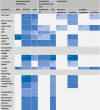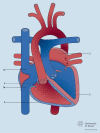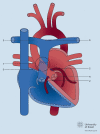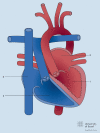[2020 ESC guidelines on treatment of adult congenital heart disease (ACHD)]
- PMID: 33258988
- PMCID: PMC7862205
- DOI: 10.1007/s00059-020-05003-0
[2020 ESC guidelines on treatment of adult congenital heart disease (ACHD)]
Abstract
The new guidelines of the European Society of Cardiology (ESC) on treatment of adult congenital heart disease (ACHD) were published in August 2020. The previous recommendations from 2010 were adapted to reflect the diagnostic and therapeutic progress made in the past 10 years. The recommendations are nearly exclusively based on an evidence level C (consensus of opinion of experts or knowledge from small studies, retrospective studies or registries). This is not surprising considering the heterogeneous patient population with a multitude of cardiac defects and repair strategies performed in the past. The cohort of ACHD patients is steadily growing in numbers and is becoming older due to reduced perioperative morbidity and mortality and further medical progress. Therefore, the current guidelines do not focus solely on the acute treatment of cardiac problems but also address the importance of a comprehensive longitudinal follow-up for a chronic, lifelong disorder. On a defect-specific level, progress in the past decade in arrhythmia diagnosis and management, percutaneous interventions and the treatment of pulmonary arterial hypertension have led to many revised or new recommendations. Finally, the 2020 guidelines also address for the first time the management of coronary anomalies.
Im August 2020 veröffentlichte die European Society of Cardiology (ESC) neue Leitlinien zur Behandlung von Erwachsenen mit angeborenem Herzfehler („adult congenital heart disease“, ACHD). Die bisherigen Empfehlungen des Jahres 2010 wurden den Entwicklungen der letzten 10 Jahre in Diagnostik und Therapie angepasst. Nach wie vor entsprechen die Empfehlungen aber nahezu ausschließlich einem Evidenzgrad C (Expertenmeinung oder Erkenntnisse aus kleinen respektive retrospektiven Studien oder Registerstudien). Wir sprechen von einer heterogenen Patientenpopulation mit einer Vielzahl von unterschiedlichen Herzfehlern und Korrektureingriffen, die sich dank sinkender perioperativer Mortalität und weiterer medizinischer Fortschritte in konstantem Wachstum befindet und älter wird. Die aktuellen Leitlinien sind dementsprechend nicht nur auf die akute Behandlung kardialer Probleme fokussiert, sondern legen das Augenmerk auf eine gesamtheitliche longitudinale Betreuung. Ergänzt werden diese allgemeinen Aspekte durch defektspezifische Empfehlungen, wobei v. a. Fortschritte bei Arrhythmiediagnose und -behandlung, invasiver Kardiologie sowie pulmonalarterieller Hypertonie zu wesentlichen Anpassungen führten. Erstmalig wird in den Leitlinien 2020 auch die Thematik von Koronaranomalien aufgegriffen.
Keywords: Cardiac anomaly; Cardiac arrhythmias; Heredity; Interventions; Pulmonary arterial hypertension.
References
-
- Baumgartner H, Budts W, Chessa M, et al. Recommendations for organization of care for adults with congenital heart disease and for training in the subspecialty of ‘Grown-up Congenital Heart Disease’ in Europe: a position paper of the Working Group on Grown-up Congenital Heart Disease of the European Society of Cardiology. Eur Heart J. 2014;35(11):686–690. doi: 10.1093/eurheartj/eht572. - DOI - PubMed
Publication types
MeSH terms
LinkOut - more resources
Full Text Sources
Miscellaneous








